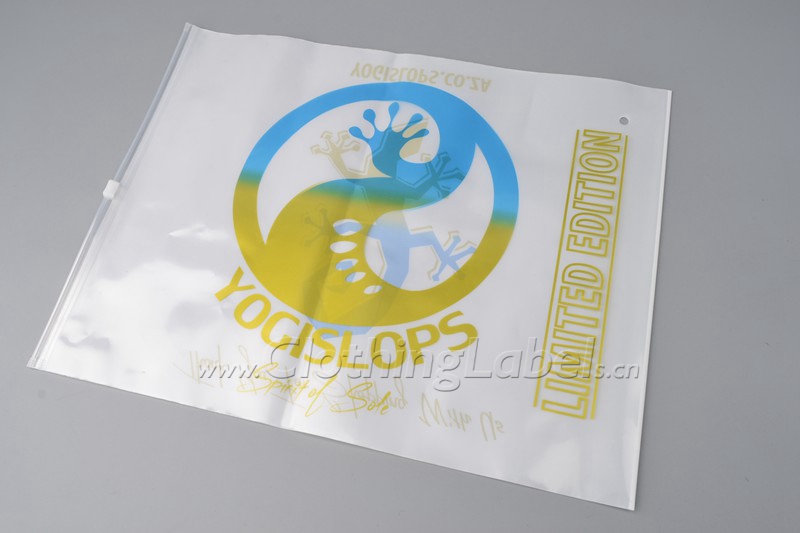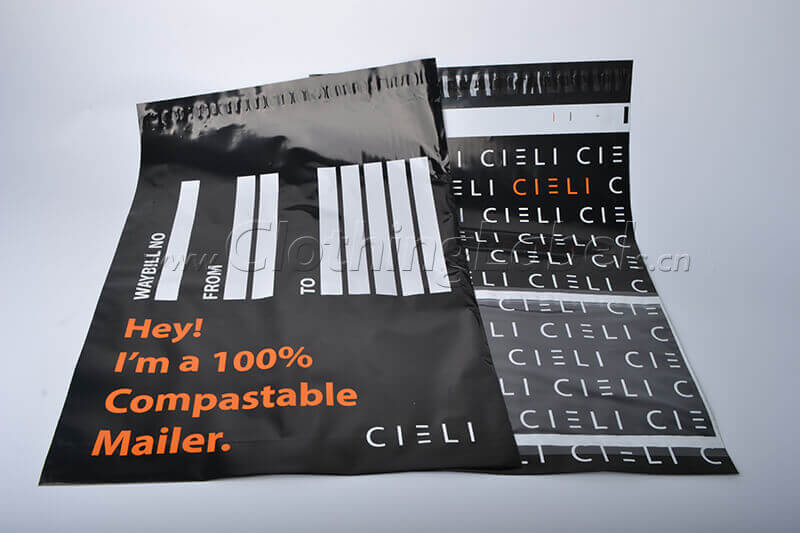Recycled plastic bags are made from plastic that has been used once. They are then collected, cleaned and processed into new material to make new plastic bags. The recycling process typically begins with the collection of used plastic bags. These are then cleaned to remove any contaminants and shredded into small pieces. The shredded plastic is then melted down and reformed into new plastic bags or other products. This process helps conserve raw materials, reduce waste, and lower energy consumption.

Details of recycled plastic bags
| Materials: | recycled PE(LDPE, HDPE, LLDPE), PVC, PVA, PP, PLA, EVA, OPP, etc; |
| Size: | 2″ x 2″ to 54 inches; customized size according to your needs; |
| Color: | 1. Single Solid Color: white, black, blue, red, green, yellow, etc; 2. Transparent/Clear or frosted color; 3. Multi-Color; 4. Pantone Matching System (PMS); 5. Customized color; |
| Bag type: | clear poly bag, frosted poly bag, zip lock bags, poly mailers, reclosable bags, retail bags, flat bags, stand-up bags, etc; |
| Logo techniques: | Screen Printing, Digital Printing, Flexographic Printing, Heat Transfer Printing, Hot Stamping, Labeling(adhesive labels or tags), etc; |
| MOQ: | 10,000 pcs; |
Environmental Benefits of recycled Plastic Bags
Reduction of Plastic Pollution
Recycled Plastic bags are a major contributor to marine litter, often ingested by marine animals like sea turtles, fish, and seabirds. Recycling reduces the need for new plastic production, which in turn reduces the amount of plastic entering the oceans. Recycling helps cut down the volume of plastic waste in landfills.
Conservation of Natural Resources
The recycling process typically uses less energy than producing new plastic from raw materials. This reduction in energy consumption helps conserve fossil fuels and reduces greenhouse gas emissions. Manufacturing plastic from raw materials requires significant amounts of water, while recycling plastic uses far less water, helping to conserve this essential resource.
Reduction in Greenhouse Gas Emissions
By recycling plastic bags, less energy is consumed in the manufacturing process, which results in lower carbon emissions. For instance, using recycled plastic reduces the need for fossil fuels to create new plastic.
Preservation of Wildlife
Wildlife, especially marine animals, are at great risk due to plastic pollution. Animals often mistake plastic bags for food, leading to ingestion or entanglement, both of which can be fatal. Recycling plastic bags helps decrease the amount of plastic waste in ecosystems, thereby protecting wildlife.
Reduction of Plastic Production
Recycling plastic bags means fewer new bags need to be produced, which reduces the overall demand for raw materials used in plastic manufacturing. This leads to a decrease in the environmental impacts of plastic production, including energy use, resource extraction, and pollution. Most plastics are derived from petroleum-based products, and extracting petroleum can be environmentally damaging. By recycling plastic bags, the need for new petroleum products is reduced.
Features of recycled plastic bags
Environmentally Friendly
Reduction of Plastic Waste: Recycled plastic bags help divert waste from landfills, where traditional plastic bags would take hundreds of years to decompose.
Lower Carbon Footprint: Producing recycled plastic bags requires less energy than manufacturing new plastic bags from raw materials, contributing to a reduction in carbon emissions.
Conservation of Natural Resources: Using recycled plastic conserves raw materials like petroleum and natural gas, which are needed to produce new plastic.
Durability and Strength
Despite being made from recycled materials, these bags maintain a high level of durability and strength. Recycled plastic bags are designed to be as sturdy and reliable as non-recycled plastic bags. Depending on the type of plastic used in the recycling process, these bags can carry a substantial amount of weight, making them suitable for various retail and packaging needs.
Cost-Effective
Recycled plastic bags are generally more affordable than new plastic bags made from virgin materials. The recycling process requires fewer raw materials and less energy, which translates into cost savings for manufacturers. This makes them an attractive option for businesses that want to reduce costs without compromising on packaging quality. Businesses can pass on the cost savings to consumers, or use the money saved on recycled bags to invest in other areas, such as marketing or customer loyalty programs.
Reusability
Recycled plastic bags are often more durable and designed for repeated use compared to single-use plastic bags. While they still may not last as long as reusable cloth bags, they can be used multiple times before showing wear, making them a better option for customers looking for a more sustainable choice.
Consumers can reuse recycled plastic bags for shopping, carrying goods, or organizing items at home, thus extending the bag’s life cycle and reducing the need for disposable alternatives.
Why choose recycled plastic bags with logo?
Growing Importance of Sustainability in Business
For businesses, adopting sustainable practices isn’t just about mitigating negative impacts on the environment—it’s about staying competitive. Using recycled plastic bags aligns with consumer expectations and demonstrates corporate responsibility. By choosing recycled plastic bags with logos, companies can showcase their commitment to sustainability while enhancing their brand image.
Reducing Plastic Waste and Environmental Impact
Recycling plastic bags also helps to reduce the harmful effects of plastic pollution. Unlike single-use plastic bags, which can take hundreds of years to decompose, recycled plastic bags can be reused and repurposed, thus extending the life cycle of the material. This reduces the amount of plastic waste that ends up in landfills and oceans, where it can cause harm to wildlife and ecosystems.
Furthermore, recycling plastic bags conserves valuable resources. The process of recycling involves breaking down used plastic into smaller components, which can then be turned into new plastic products, including bags, containers, and even construction materials. By supporting the recycling industry through the use of recycled plastic bags, businesses play an essential role in the circular economy, where materials are reused and recycled instead of discarded.
Branding and Marketing Advantages
Logoed recycled plastic bags serve as an effective way to increase brand visibility. Whether it’s a shopper using the bag at a grocery store, a visitor walking down the street with it, or someone leaving a café with your branded packaging, your logo is constantly being seen by potential customers. The bags can act as a form of passive advertising, which is especially important for small and medium-sized businesses that may not have the resources for expensive traditional advertising campaigns.
The logo on a recycled plastic bag can create a sense of brand recognition, encouraging repeat customers and fostering loyalty. Over time, customers begin to associate your brand with positive values such as sustainability, eco-consciousness, and social responsibility, which can drive both brand loyalty and new business.
Factors to Consider When Choosing recycled plastic bags
Material Quality
Recycled PE: This is one of the most common types of recycled plastic used for bags. It’s durable, flexible, and can carry a significant amount of weight.
Recycled PP: This material is often used for bags that require greater stiffness or more structure, such as for retail or grocery bags.
Blended Plastics: Some bags are made from a combination of recycled PE and other materials to enhance their strength and performance.
Bag Thickness and Strength
Micron Thickness: Plastic bags are typically measured in microns, with thicker bags being more durable. A standard grocery bag, for example, may be around 50 microns, while smaller or thinner bags might be in the 20-30 micron range.
Weight Capacity: If you need bags for heavier items (e.g., groceries or books), choose a thicker, more durable option. Lighter bags are ideal for smaller, less bulky items.
Recycling Process and Certification
Some bags are made from 100% post-consumer recycled plastic, meaning the material has been sourced from used plastic products and then processed into new bags.
Other bags may be made from plastic waste generated during the manufacturing process, which can also be recycled but may not be as environmentally impactful as post-consumer recycling.
Look for certifications such as “Recyclable”, “Post-Consumer Recycled”, or “Eco-Friendly” labels to ensure that the bags meet environmental standards.
FAQs
1, What is the price to customize recycled plastic bags with logos?
–The price depends on your custom size, color, technics, quantity, or logo files. Prices are not fixed. It needs our business expert to calculate according to your specific needs. The more quantity, the cheaper the unit price. The smaller the quantity, the higher the unit price.
2, What are the mass production time and shipping time?
–Mass production time is 15-20 days. Shipping time is 3-6 business days by express.
3, What profile is needed when production?
–Please send us your vector design files/logo files, like PDF, AI, ESP, CDR, or original files from PSD. If you have no art file, we offer free design for you.
4, What is the order process?
–First, we need to discuss basic information with each other. Such as size, color, material, quantity, technics, etc. Then our product expert will give you the price and invoice. Then, you can pay. After you pay, we will make the design for you. After you confirm the design, we can arrange the bulk production. We offer free design and worldwide shipping.
Photo gallery of recycled plastic bags






Free Design | Free storage service | One-to-One Support | One-Stop Purchasing
Using Recycled Plastic Bags for Your brand Business
Our Product Experts will guide you through every step of the custom process.
